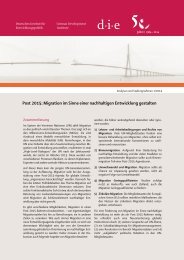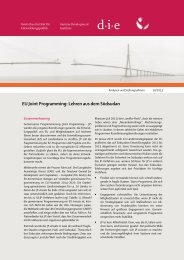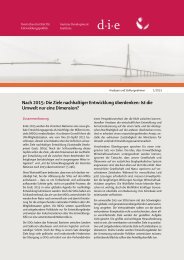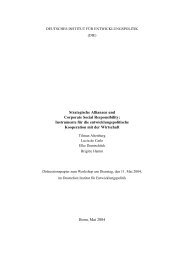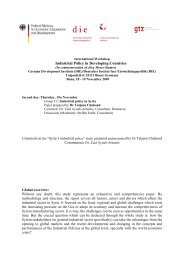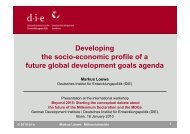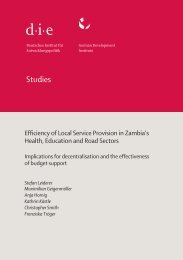Middle East / North Africa and the Millennium Development Goals ...
Middle East / North Africa and the Millennium Development Goals ...
Middle East / North Africa and the Millennium Development Goals ...
Create successful ePaper yourself
Turn your PDF publications into a flip-book with our unique Google optimized e-Paper software.
Markus Loewe<br />
so-called International <strong>Development</strong> <strong>Goals</strong> 2 were to be pursued <strong>and</strong> implemented<br />
by each country on its own. The key consideration here was<br />
“qualitative factors in <strong>the</strong> evolution of more stable, safe, participatory<br />
<strong>and</strong> just societies. These include capacity development for effective,<br />
democratic <strong>and</strong> accountable governance, <strong>the</strong> protection of human rights<br />
<strong>and</strong> respect for <strong>the</strong> rule of law. We will also continue to address <strong>the</strong>se<br />
less easily quantified factors of development.” (OECD/DAC 1996, 2).<br />
In return, <strong>the</strong> industrialized countries were to offer <strong>the</strong> developing countries<br />
broad <strong>and</strong> effective support in <strong>the</strong>ir efforts to reach <strong>the</strong> goals: on <strong>the</strong><br />
one h<strong>and</strong> by boosting <strong>the</strong>ir official development assistance, but on <strong>the</strong><br />
o<strong>the</strong>r h<strong>and</strong> also by improving <strong>the</strong> coordination of <strong>the</strong>ir development cooperation<br />
both among one ano<strong>the</strong>r <strong>and</strong> with <strong>the</strong> orientation <strong>and</strong> planning activities<br />
of <strong>the</strong> developing countries:<br />
“Effective international support can make a real difference in achieving<br />
<strong>the</strong>se goals. This is far from saying that <strong>the</strong>y can be achieved by aid alone.<br />
The most important contributions for development, as in <strong>the</strong> past,<br />
will be made by <strong>the</strong> people <strong>and</strong> governments of <strong>the</strong> developing countries<br />
<strong>the</strong>mselves. But where this effort is forthcoming it needs <strong>and</strong> deserves<br />
strong support from <strong>the</strong> industrialised countries. We commit ourselves<br />
to do <strong>the</strong> utmost to help.“ (OECD/DAC 1996, 2).<br />
Then, in September 2000, <strong>the</strong> <strong>Millennium</strong> Summit adopted <strong>the</strong> <strong>Millennium</strong><br />
Declaration. It consists of eight chapters: The first has <strong>the</strong> character<br />
of a preamble, while all o<strong>the</strong>rs are programmatic in nature. Four chapters<br />
are devoted to <strong>the</strong> <strong>the</strong>mes “Peace, security <strong>and</strong> disarmament” (Chapter 2),<br />
“<strong>Development</strong> <strong>and</strong> poverty eradication” (Chapter 3), “Protecting our<br />
common environment” (Chapter 4), <strong>and</strong> “Human rights, democracy <strong>and</strong><br />
good governance” (Chapter 5). Chapter 6 is concerned with “<strong>the</strong> vulner-<br />
2 The International <strong>Development</strong> <strong>Goals</strong> are: (i) a reduction by one half in <strong>the</strong> proportion<br />
of people living in extreme poverty by 2015; (ii) universal primary education in all<br />
countries by 2015; (iii) demonstrated progress toward gender equality <strong>and</strong> <strong>the</strong> empowerment<br />
of women by eliminating gender disparity in primary <strong>and</strong> secondary education<br />
by 2005; (iv) a reduction by two-thirds in <strong>the</strong> mortality rates for infants <strong>and</strong> children<br />
under age 5; (vi) a reduction by three fourths in maternal mortality, all by 2015; (v) access<br />
through <strong>the</strong> primary health-care system to reproductive health services for all individuals<br />
of appropriate ages as soon as possible <strong>and</strong> no later than <strong>the</strong> year 2015; (vii) <strong>the</strong><br />
current implementation of national strategies for sustainable development in all countries<br />
by 2005, so as to ensure that current trends in <strong>the</strong> loss of environmental resources<br />
are effectively reversed at both global <strong>and</strong> national levels by 2015.<br />
30 German <strong>Development</strong> Institute



